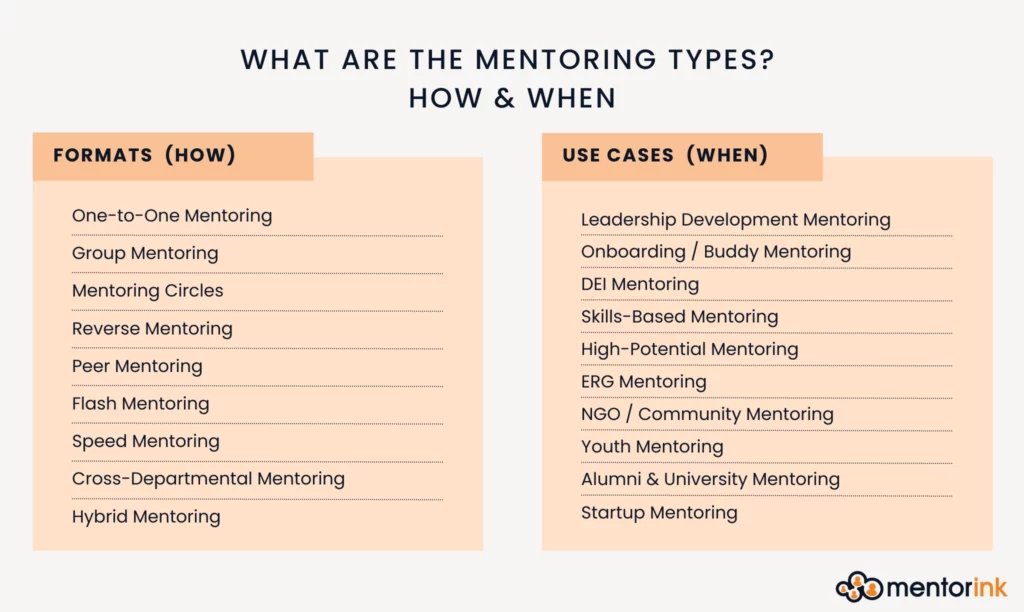
Can you think of the most valuable piece of advice you have ever been given. Probably, it did not come from a textbook or a manual. It came from a person who took the time to guide you. This is the magic of mentoring. Mentorship is human, powerful, and ready to shape the way we grow, learn, and connect today.
Think of this page as your front door into mentoring. Some arrive curious, others already run programs and want fresh ideas. In both cases, this is your place to dive deeper into what mentoring means, how it works, and where it is heading across Workplaces, NGOs, and universities.
Mentoring Definition
What does mentoring mean? We can define mentoring as a learning relationship where one person shares knowledge, guidance, or perspective to help the other grow. Mentoring doesn’t have strict rules, and it goes beyond one-to-one career advice. Mentorship can happen in workplaces, NGOs, universities, community settings, or even in your gym. Its shape depends on the needs of the people involved.
The definition of mentorship involves more than just giving instructions. The partners should create a space for growth, build trust, and encourage new ways of thinking. Sometimes it is formal, and sometimes it is completely informal, but at the end, the meaning of mentoring always comes back to people empowering people.
So, what is mentorship? It is an intentional connection that helps someone learn from another’s experience. That connection benefits not only the mentee but also the mentor, since both the mentee and the mentor gain insights and inspiration through the exchange.

The History of Mentoring
Mentoring isn’t the new kid on the block. Mentoring was already a part of life, long before mentoring became a structured practice in workplaces and communities. People have always passed down knowledge, shared experiences, and guided each other. Remember, the first wheel was found, sure, but the second was taught. Before we explain why mentoring is still so important now, we must first explore its history.
Where the Term Comes From
Let’s go back thousands of years, to ancient Greece. In Homer’s Odyssey, there was a friend called Mentor. He was more than a companion; he was the trusted friend who guided young Telemachus when his father, Odysseus – Mentor’s friend, was away. Years later, “mentor” is still used for those offering trusted guidance, and “mentee” for those receiving it. The myth may feel old, but the dynamic it describes is still the essence of mentoring today.

How Mentoring Has Evolved Over Time
Throughout history, mentoring has taken many forms. The word comes from myth, but the practice has evolved with every age. In medieval times, it was often compared to apprenticeships, where skills were passed from master to learner. By the 18th century, writers like Fénelon redefined the idea in more humanistic and educational ways, shaping the meaning of mentorship we recognize today. Despite these shifts, the purpose of mentorship has always been the same: supporting growth through guidance and shared experience.
Mentoring in Today’s Context
Now more than ever, mentoring is everywhere, from universities and companies, to NGOs, and communities, supporting people in both professional and personal growth. Mentoring relationships can come in different shapes, some are formal, with clear structures and goals, while others are informal and grow naturally through trust and shared interest.
Modern mentorship has also become more personalized. It’s not ‘one-size-fits-all’ models anymore, because they don’t truly meet the needs of today’s learners. After all, every single individual brings different experiences, learning styles, and expectations. Younger generations – especially Millennials, Gen Z, and Gen Alpha on the way – view mentoring as a path to long-term growth and well-being. For them, mentoring is not just a tool to solve immediate challenges. The impact of mentoring clearly shows in education. A study done by Youth Mentor reveals that students with regular mentoring are 52% less likely to skip a day of school and 37% less likely to miss a class.
All in all, today’s mentoring is both flexible and diverse. It can adapt to different contexts and individuals, and it continues to be one of the most impactful ways people learn, connect, and grow together.
What Mentoring Is & Isn’t
If you ask ten people what mentorship is, chances are you’ll get ten different answers. Some may capture the true spirit of mentoring, while others may miss the point. To clear things up, let’s look at what mentoring really is and what it is not.
Mentoring IS
- A two-way experience where both mentor and mentee grow
- Focused on development, learning, and building new skills
- Rooted in trust and genuine connection
- Flexible enough to work in both structured programs and informal chats
Mentoring IS NOT
- A single conversation with no follow-up
- A one-sided dynamic where only one person gains
- A quick fix for every challenge
- A box-ticking exercise with no real connection
Core Principles of Mentoring
Mentorship can look different in every other pairing, but the basics are simple: trust, clarity, and consistency. What’s more, when mentorship combined with training, it turns learning into practice: people can actually apply what they’ve learned, and knowledge becomes action. This combo creates benefits for both individuals and organizations, from skill development and confidence to greater engagement and retention.
Confidentiality & Trust
Trust. It is THE foundation of any mentorship relationship. Both mentor and mentee need to feel safe to share openly, and confidentiality is key to building that safety. Respecting privacy creates the space for honest conversations and real growth.
Setting Clear Goals
When people set their expectations in the very beginning, mentoring becomes the best version of itself. It is very important to define mentoring goals; it helps both sides stay focused and measure progress. For practical tips on goal setting, you can check this guide.
Establishing Boundaries
Clear boundaries keep mentorship healthy and sustainable. This includes agreeing on time commitments and respecting personal and professional limits. Boundaries ensure the relationship stays productive and balanced.
Active Participation
Mentoring is a two-way street. It may seem like only mentees have to take action, but mentors have their part to play as well. Mentees should take initiative in their own growth, while mentors listen actively and provide thoughtful guidance. The more engaged both sides are, the more effective the relationship becomes.
Feedback & Reflection
What is mentoring without regular feedback? Feedback and reflection keep the relationship on track. Together, they build a habit of continuous improvement, allowing both mentor and mentee to learn from their experiences and adjust along the way.
Consistency & Communication
Last but not least, consistency and communication. Successful mentorship isn’t about one big breakthrough. It’s about small, regular check-ins and honest conversations that build trust, keep growth on track, and spark lasting change for both people and organizations. A study found that retention rates reach 72% for mentees and 69% for mentors, compared to only 49% for those without mentoring.
What are the Mentoring Types?
Mentoring does not follow a single path. Depending on the goal, it can take different forms and be used at different moments. Broadly, mentoring types can be understood in two ways: how mentoring happens (formats) and when or why it is applied (use cases).

How Mentoring Happens (Mentoring Formats)
- One-to-One Mentoring
The classic format, pairing one mentor with one mentee for regular, focused conversations. It allows for personal guidance and strong trust.
- Group Mentoring
One mentor works with several mentees at the same time, or peers meet in small groups to share experiences. It builds community and scales learning.
- Mentoring Circles
Small, facilitator-led groups where everyone contributes as both mentor and mentee. Circles encourage shared learning and cross-level dialogue.
- Reverse Mentoring
Junior employees mentor senior colleagues, often on technology, culture, or inclusion. It flips the script and helps bridge generational gaps.
- Peer Mentoring
Colleagues at similar levels guide each other by sharing experiences, challenges, and accountability. It strengthens collaboration and belonging.
- Flash Mentoring
A one-time or very short mentoring conversation around a specific topic or question. It is common in events and onboarding contexts.
- Speed Mentoring
A series of short, timed sessions where mentees rotate across multiple mentors to gather quick insights. Think “speed dating,” but for knowledge.
- Cross-Departmental Mentoring
Pairs people from different teams or business units to break silos and spark collaboration. It helps broaden perspective across the organization.
- Hybrid Mentoring
Blends in-person and virtual meetings, combining flexibility with the trust that comes from face-to-face connection.
When Mentoring Happens (Use Cases)
- Leadership Development Mentoring
Designed to prepare future leaders by pairing them with experienced managers or executives. It builds strategic thinking and leadership skills, an important step since 84% of workers report unnecessary stress from poorly trained managers.
- Onboarding / Buddy Mentoring
Supports new employees during their first months by pairing them with experienced peers. It helps them adapt faster and feel included.
- Corporate or DEI Mentoring
Focuses on diversity, equity, and inclusion by connecting underrepresented employees with allies or senior sponsors. It broadens networks and visibility.
- Skills-Based Mentoring
Transfers specific technical or professional expertise from experienced practitioners to learners. It is especially useful for upskilling teams quickly.
- High-Potential Mentoring
Targets rising talent who are preparing for bigger roles. It accelerates growth and strengthens retention.
- ERG Mentoring
Connects members of Employee Resource Groups (ERGs) with mentors who share similar backgrounds or experiences. It strengthens belonging, builds leadership within ERGs, and supports career advancement for underrepresented groups.
- Alumni & University Mentoring
Connects alumni with students to share career insights and supports international students in adapting to new environments. Programs like these boost success rates, with 74–77% of mentored students graduating, compared to 55.9% overall.
- NGO / Community Mentoring
Pairs volunteers, activists, or community members with experienced mentors. It helps NGOs build leadership capacity, improve collaboration, and create a stronger impact in society.
- Startup Mentoring
Links entrepreneurs or early-stage founders with experienced business leaders. It accelerates growth, avoids common pitfalls, and provides guidance on fundraising, scaling, and team building.
The Future of Mentoring
Mentorship keeps evolving with technology. Hybrid models and new tools make it more flexible, accessible, and easier to connect. Mentoring software supports this shift by helping organizations adapt faster, while staying cost-effective by using the knowledge they already have.
Virtual and Hybrid Mentorship
The rise of remote and hybrid work has made virtual mentoring a necessity rather than an option. Mentoring software now plays a central role in supporting these connections, helping people engage across locations while keeping the experience inclusive and flexible.
The Role of Technology and AI
Technology is reshaping how mentoring works, from smarter matching to personalized support. Mentoring software platforms can integrate AI to suggest better pairings, surface useful resources, and make the process more efficient. Still, the heart of mentoring remains human: AI mentoring may support the process, but trust, empathy, and shared experience cannot be replaced by algorithms.

Key Takeaways
Mentoring has a long history and still holds its place as one of the most effective ways for people to learn, grow, and share knowledge. It has always been about trust, guidance, and the art of supporting development.
Today, organizations continue to rely on mentoring to strengthen their people and prepare for the future. To keep this practice relevant in a fast-changing world, it also needs to adapt. Mentorink helps make this possible by simplifying connections through software while keeping the human side at the center. If you would like to see how mentoring can work in your organization, you can book a demo with Mentorink.


